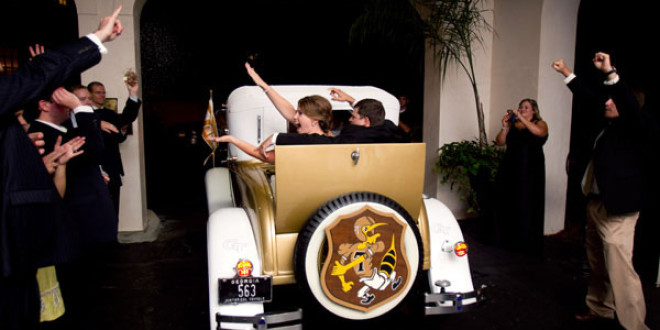[ad_1]
You're looking forward to that special day when you finally tie the knot, but one thing you're probably not jazzed about is working out your wedding budget. Weddings can be great fun to plan, but budgeting for them is complicated. There's a lot you have to factor in, and plenty that's easy to forget until the last minute. Working out your budget in advance and carefully keeping track of your expenses as you go can help you make the most of your wedding budget.
Before you start working out the details, you need to figure out how much money you have to distribute. This means you need to know where it's coming from. Step one should be to sit down with both your families (one at a time) and figure out who can contribute what. Usually the partners contribute something as well.
Once you've worked out who's paying what, you need to make a list of what you need. This can vary a great deal depending on whether you're going to have a formal, elaborate honor or a simple one, and whether you're going to throw an extravagant party or host an intimate get-together for the reception. What are some basics you'll need to account for?
- Wedding reception. This will probably be about half your cost. This includes catering, drinks and your wedding cake.
- Wedding ceremony and registration. This is usually only a small part of the overall bill.
- Wedding attire. This can vary a great deal, but expect it to account for about 10% of the bill.
- Flowers for your wedding. This will probably be another 10%.
- Entertainment. Music for your reception (and your ceremony) will need to be budgeted, again about 10%.
- Memorabilia. You'll want to remember your special day, so plan to pay a photographer or videographer another 10% to
- capture your best moments.
- Invitations. This is a reliably small expense.
- Wedding rings. This is also a reliably small expense.
- Parking or transit for your guests. This is one of those things that is easy to forget, but very important to factor
- in.
- Wedding gifts. You'll need gifts for your bridesmaids / groomsmen and parents. You may also want to get gifts for your
- other guests.
- Miscellaneous / Unforeseen Expenses. Set aside 5-10% of your budget for other expenses you do not foresee. A little
- buffer can help a lot!
Once you have a basic plan with dollar amounts worked out for everything, you can make life easier for yourself by putting the data in a spreadsheet. Create a column for the different expenses, another with the percentage you expect to spend for each, and a third with the dollar amount you're aiming for. Create a fourth column with the amount you're actually spending. That way you can track your spending as you go to determine if you're under or over budget for each category and for your overall wedding bill. This way you can look for ways to save if you need to, or spend a little extra money on something special if you're under budget!
Enjoy budgeting your wedding – it does not have to be stressful if you plan and track your spending carefully!
[ad_2]
Source by Milton Dove

